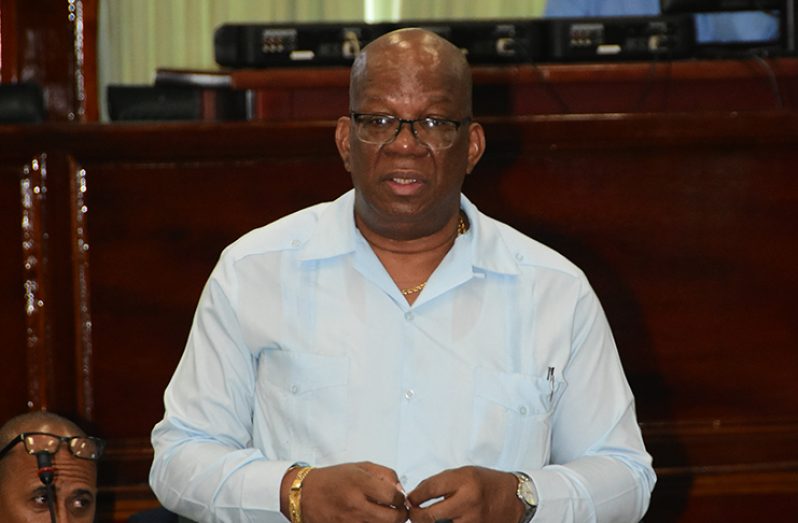– Bank of Guyana granted authority over licensing of financial institutions
THE modernisation of the banking sector is closer to realisation following the passage of an amendment to the Financial Institutions Act which consequentially strengthens the authority of the Bank of Guyana.
The move was made possible via the passage of the Financial Institutions Amendment Bill, Bill #5/2018 which seeks to amend the Financial Institutions Act.
The bill seeks to amend sections of the act including placing power in the hands of the Bank of Guyana to revoke licenses issued to financial institutions if they do not satisfy several requirements.
These include if the entity has not fulfilled or is unlikely to fulfill or no longer fulfills the minimum criteria for licensing under the act.
Under the amended legislation, the license of the financial institution can also be revoked if the entity provides false, misleading or inaccurate information in connection with an application for license, or if it fails to comply with any order or direction issued by the Bank of Guyana after having been given reasonable time to do so.

The amended act also makes way for the Bank of Guyana to be the authority responsible for resolution of licensed financial institutions. According to the amendment, in order to resolve a licensed financial institution, the Bank of Guyana shall exercise control over the licensed financial institution, operate and conduct the activities of that institution with all the powers of its shareholders and management bodies and manage and dispose of the assets and property of that institution.
The amendment sets out a number of other responsibilities which the Bank of Guyana can enforce on a financial institution which has not complied with the Financial Act.
RESTORE CONFIDENCE
Minister of Finance, Winston Jordan, who piloted the bill, told the National Assembly on Thursday evening that bills such as the Financial Amendment Bill #5/2018 are intended to strengthen and modernise the powers to the Bank of Guyana, “to restore confidence and move swiftly”, adding: “We cannot afford to wait until it happens to then put a system in place.”
Opposition Member of Parliament Irfaan Ali told the National Assembly that he favours modernisation of the financial architecture of the nation. He noted too that it is a process which started under the Opposition People’s Progressive Party (PPP) while that party was in power.
Ali went on to paint a picture of the performance of the country’s economy and during his presentation, he was continuously guided by the Speaker of the National Assembly, Dr Barton Scotland to steer his presentation within the boundaries of the bill.
Minister Jordan noted that indeed the bill is “really a continuation of work which was started by the Opposition when they were in government”.
He said as far back as 1995, there was a Development Credit Agreement that was signed in January that year. “Since 1995, it talks about strengthening the banking sector. Strengthening of Bank of Guyana through regulations, directives to carry out supervisory activities, the trend continued through the 1990s,” Jordan noted
He said the Opposition has argued “where did these bills come from.” But he noted that “these bills didn’t fall out of the sky, they have a history.”
NOTHING WAS DONE
The minister said recommendations were made to improve the resolution and potential oversight of the Bank of Guyana, and according to him, 14 years passed and nothing was done.
“We come today having to do the work that should have been done 14 years ago,” he said.
Jordan said the the legislation was drafted by the office of the Attorney General who assured him that it is consistent with the laws and Constitution of Guyana. “I am taking the assurance that there is nothing in here that limits the judiciary,” he said.
In response to statements made by the Opposition that there were no consultations with the banking sector, Jordan said, “I do not know where this propaganda is coming from, there appears to be an orchestrated attempt, possibly originated in the Opposition to get certain private sector organisations to put pressure on the government.”
The finance minister told the National Assembly that the banking sector, in all relevant matters were represented at a meeting on June 27 last and the list included Hand- in- Hand Trust, the New Building Society, Bank of Nova Scotia, Guyana Bank for Trade and Industry (GBTI), Citizens Bank, Demerara Bank and Republic Bank (Guyana) Limited .
He made reference to other moves by the government to pass legislation in the National Assembly to improve the financial architecture of Guyana, notably amendments to the Credit Reporting Act to strengthen and to give full effectiveness to the act which he noted was a “creature” of the former government.
As a result, he said increasingly, credit reporting and risk as measured by one’s credit is being used by a number of financial institutions in the country.
“The bill is good for Guyana and brings us in line with modern practices,” Jordan noted moments before the legislation was passed by the National Assembly.




.png)









